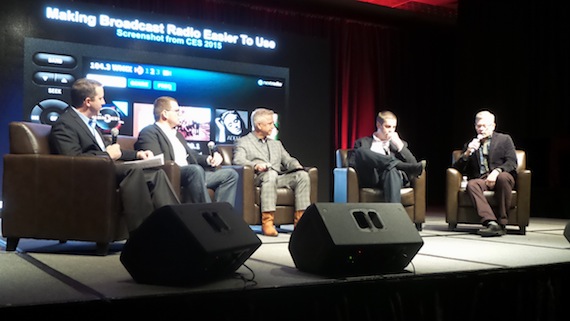

(L-R): Moderator Chris Barker (Partner, C3), Derek Kuhn (QNX/Blackberry), Joel Hoffman (Chief Automotive Strategist/Intel), John Ellis (Ellis & Assoc., former Sr. Technologist/Ford), and Paul Brenner (Emmis/NextRadio).
Imagine a car that drives itself, that knows your schedule and drives you to your appointments. It knows the quickest route and can reroute based on accidents or heavy traffic. If you are running late, it can notify your appointment. The video below shows all this and more, and was viewed by attendees at the CRS panel “The Power of the Connected Car” on Thurs., Feb. 26.
Panelists discussed the capabilities of the cars of the future, including autonomous drive, cars that can communicate with each other and share information, and how users can make purchases through the car’s ecosystem.
Panelist Paul Brenner of Emmis/NextRadio said, “I applaud you for attending, you’re hearing from three guys that will decide your future,” referring to his fellow panelists. Brenner is working to help traditional radio evolve to compete with the growing popularity of streaming and on-demand music. The NextRadio app plays over-the-air FM broadcasts on smartphones.
Panelists noted that following the debut of streaming music, there was a few years before the technology made its way to automobiles, which helped the terrestrial radio industry maintain a foothold with the public, particularly in cars. Today, technology allows more music listening options in vehicles, and listeners could choose to get music from other outlets, instead of over-the-air radio. Terrestrial radio’s foothold is eroding.
One downside of terrestrial radio, is that users don’t get to select the music. “You listen to what other people tell you to,” noted John Ellis (Ellis & Assoc., former Sr. Technologist, Ford).
Panelists including Brenner, Ellis, Joel Hoffman (Chief Automotive Strategist, Intel), and Derek Kuhn (QNX/Blackberry) agreed that going forward, the car’s ecosystem (think of it like an operating system) will play a bigger role when consumers purchase a new vehicle. It will be similar to cell phone purchases today, which are based heavily on the operating system (Android vs. Apple) instead of the hardware, or phone itself.
Today, terrestrial radio doesn’t have a prominent place in these automotive ecosystems.
In order to survive, radio companies need a strategy said panelists. They will need to enhance user experience and engagement. Brenner said, “[Radio] will have to innovate and establish an advantage they can’t take away from you.”
Safety is a major concern that goes along with having automobiles with lots of features. Security of the information being exchanged is also a top priority.
When asked how long it will be before the cars of the future are on streets, the panelists explained that currently the auto industry can’t meet the expectations of the next generation of drivers (today’s children) while balancing the safety issues of distracted driving.

About the Author
Sarah Skates has worked in the music business for more than a decade and is a longtime contributor to MusicRow.View Author Profile


